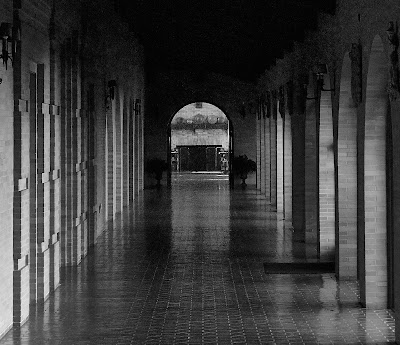Wis 11:22-12:2
Ps 145 1-2, 8-9, 10-11, 13,14
2 Thes 1:11-2:2
Lk 19:1-10
Zacchaeus’ story is fascinating. As narrative it is rich with details: the unruly crowd, a short man running ahead and climbing a sycamore tree, the grumbling and consternation of the onlookers when Jesus invited himself to Zacchaeus’ house. We hear the dinner conversation. And then we hear Jesus’ promise: “Salvation has come to this house.” It would be easy to film this scene. The atmosphere, cast, stage directions, and dialogue are already there. Just grab a cell phone and hit the record video button.
Zacchaeus’ story is fascinating because Zacchaeus is us. He is us because he is a man of contradictions and confusion. He is a man who doesn’t always do the right thing but who, when he becomes aware of his sin, tries to atone for it though we don't know if he managed to do so.
This narrative appears late in Jesus’ public ministry. Some wanted this inconvenient man killed. In another two chapters of Luke we hear the narrative of the Last Supper. The tension is increasing as Jesus nears Jerusalem, his reputation preceding Him.
Zacchaeus had obviously heard about Jesus and knew his reputation. There is no other explanation for why he would go to such lengths and be willing to look ridiculous when he climbed a tree so as to get a better look at this man.
The questions about Zacchaeus are: What did Zacchaeus expect to see? Who did he expect to see? We must ask ourselves the same two questions: Who and what do we expect to see in Jesus? Do we expect a miracle worker who heals the sick and the lame upon request? Do we demand a political leader and social justice warrior who shares and endorses our agendas if we insist He does? Are we looking for a hotheaded virtue-signaling radical? Or do we want a run of the mill wisdom teacher spouting maxims worthy of being printed in large font in colored boxes?
Do we want a Jesus who is nothing more than a basically nice guy who will never cause us to question ourselves or our actions or do we want a man who will permit anything at all if the word love is inserted somewhere? Who is Jesus for each of us? What do we expect of Him? More importantly, what should we expect of ourselves?
There is an interesting bit of wordplay in this gospel that brings up an important point. First we read, “Zacchaeus was seeking to see who Jesus was.” And then: “For the Son of Man has come to seek and to save what was lost.” Jesus is looking for the one who is looking for him. Jesus wanted to meet the one who wanted to meet him. And so it is for us. Jesus is seeking us even before we seek Him. And he continues to seek us even if we quit seeking Him, become indifferent or even hostile towards Him.
Zacchaeus' story is a conversion story of a man who, upon his encounter with Jesus, vowed to reform his life. He promised to give half of his possessions to the poor and to reimburse those he had extorted quadruple the overcharge.
As is true of Jesus’ parables we don’t know what happened afterwards. We don’t know if Zacchaeus made these promises in the heat of the moment only to renege when he realized what he had promised. We don’t know if he questioned why he had a commitment to this man. We will never know if he discarded his vow to reform when something more attractive presented itself.
Zacchaeus is us. He is us who seek to find, to know, and to see Jesus.
He is us who are being sought by Jesus more than we can imagine.
We need only come down from the tree to be welcome at the table of the altar. We need only descend from our perch to partake of the supper where we are assured, just as Zacchaeus was assured, “Today salvation has come to this house.”
What is the rest of Zacchaeus’ story?
What will the rest of our story be?
We don't know the end of Zacchaeus' story. We won't know the end of our story until it has ended.
As a bit of an experiment, after Mass grab some paper, and write:
____________________________________
Fog can be a photographer's best friend, adding atmosphere, mystery, softness, and many other elements to a photo. Photos taken in foggy conditions allow for a greater degree of processing than do color shots in part because of function in the sensor. As sensitive as a camera's sensor is it is no match for the subtle abilities of the human retina to discern the subtleties of color. Not even close.
All of the ones below were shot in June a few years ago. The grass and trees were lushly green. Any increase in contrast effected the green in an unattractive way. Black and white solved all the problems and adds much to the shot. All were taken in the same afternoon up in Vermont.
+ Fr. Jack SJ, MD































